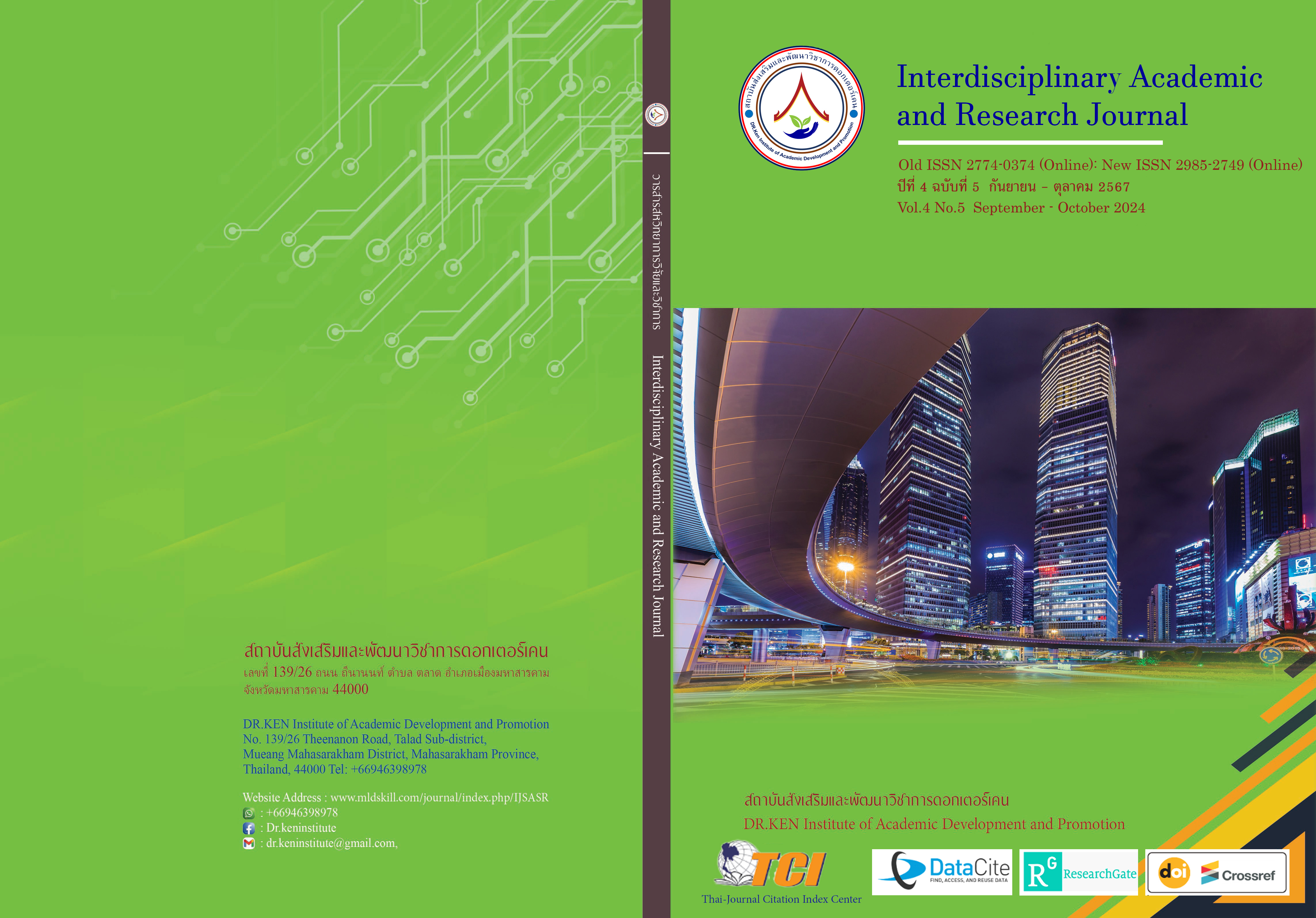Transformational Leadership of Educational Institution Administrators under the Office of the Vocational Education Commission, Chonburi Province
DOI:
https://doi.org/10.60027/iarj.2024.276084Keywords:
Leadership Behavior; , Transformational LeadershipAbstract
Background and Aims: This research has the following objectives: 1) to study the level of transformational leadership behavior of school administrators under the Office of the Vocational Education Commission, Chonburi Province. 2) To compare opinions about the transformational leadership behavior of school administrators in Chonburi Province. 3) To find ways to develop transformational leadership of school administrators under the Office of the Vocational Education Commission, Chonburi Province.
Methodology: The sample used in this research consisted of 276 school administrators and teachers. The sample size was determined according to Krejci and Morgan's table. and use stratified random sampling The research instrument was a questionnaire with a 5-level rating scale. Which has a consistency index between 0.80 - 1.00 and the confidence value of all questionnaires is equal to 0.98. For data analysis, statistics are used, including frequency, percentage, mean, standard deviation, T-value and F-value tests.
Results: The results of the research are as follows: (1) the transformational leadership of educational institution administrators under the Office of the Vocational Education Commission, Chonburi Province, overall and in each area, is at a high level. (2) Results of comparing opinions about transformational leadership of school administrators classified by position and work experience. It was found that overall and in each aspect there were no differences. But when classified by educational level It was found that there was a statistical significant difference at the 0.05 level. (3) Guidelines for developing transformational leadership among school administrators are divided into 3 approaches: 1) development by external agencies, 2) development by educational institutions, and 3) development by oneself.
Conclusion: The study finds that transformational leadership among educational institution administrators in Chonburi is generally high, with no significant differences based on position or work experience, but the educational level has a significant impact. External agencies, educational institutions, and personal efforts can all help to develop this type of leadership.
References
กมลวรรณ นาจุ้ย. (2561). การศึกษาภาวะผู้นำและแนวทางการส่งเสริมภาวะผู้นำการเปลี่ยนแปลงของผู้บริหารสถานศึกษา สังกัดสำนักงานเขตพื้นที่การศึกษาประถมศึกษากำแพงเพชร เขต 1. วิทยานิพนธ์ปริญญาครุศาสตรมหาบัณฑิต สาขาวิชาการบริหารการศึกษา มหาวิทยาลัยราชภัฏพิบูลสงคราม.
ณัฐฌานันท์ เรือนตาหลวง. (2554). พฤติกรรมภาวะผู้นพการเปลี่ยนแปลงในผู้บริหารสถานศึกษาของผู้บริหาร ครู และคณะกรรมการสถานศึกษา สังกัดสำนักงานเขตพื้นที่การศึกษาสิงห์บุรี. วิทยานิพนธ์ปริญญาศึกษาศาสตรมหาบัณฑิต สาขาวิชาการบริหารการศึกษา มหาวิทยาลัยราชภัฏเทพสตรี.
ธัญญามาศ แดงสีดา. (2565). ภาวะผู้นำการเปลี่ยนแปลงของผู้บริหารโรงเรียนขยายโอกาสทางการศึกษาสังกัดสำนักงานเขตพื้นที่การศึกษาประถมศึกษาระยอง เขต 1. วิทยานิพนธ์ศึกษาศาสตรมหาบัณฑิต สาขาวิชาการบริหารการศึกษา คณะศิลปศาสตร์ มหาวิทยาลัยเกริก.
บุญชม ศรีสะอาด. (2553). วิธีการทางสถิติสาหรับการวิจัย เล่ม 1. กรุงทพฯ: สุวีริยาสาส์น.
ปิยวรรณ วิเศษสุวรรณภูมิ และ พิทชยา ตั้งพรไพบูลย์. (2566). กรอบความคิดแบบเติบโต : ทักษะที่จำเป็นแห่งโลกยุคพลิกผัน (Growth Mindset: An Essential Skill of VUCA World). Journal of Education Studies, 51(1), 1-12.
พิมพ์ชนก อินทะโชติ. (2561). ความสัมพันธ์ของภาวะผู้นำการเปลี่ยนแปลงของผู้บริหารสถานศึกษากับวัฒนธรรมองค์การภายในสถานศึกษาตามทรรศนะของผู้บริหารและครู สังกัดสำนักงานเขตพื้นที่การศึกษาประถมศึกษาลพบุรี. วิทยานิพนธ์ปริญญาครุศาสตรมหาบัณฑิต สาขาวิชาการบริหารการศึกษา มหาวิทยาลัยราชภัฏเทพสตรี.
ยลพรรษย์ ศิริรัตน์ และ มัทนา วังถนอมศักดิ์. (2562). ตัวบ่งชี้คุณภาพการศึกษาของโรงเรียนประถมศึกษา. วารสารการบริหารการศึกษา มหาวิทยาลัยศิลปากร, 10(1), 488-510.
ระพีพร ภูแล่ดี. (2562). แนวทางการพัฒนาภาวะผู้นำของผู้บริหารสถานศึกษา สังกัดสำนักงานเขตพื้นที่การศึกษาประถมศึกษากาฬสินธุ์ เขต 3. วิทยานิพนธ์ปริญญาครุศาสตรมหาบัณฑิต สาขาวิชาการบริหารจัดการการศึกษา มหาวิทยาลัยราชภัฏมหาสารคาม.
รัฐนันท์ สุนันทวนิช. (2561). การศึกษาความสัมพันธ์ระหว่างภาวะผู้นำการเปลี่ยนแปลงกับความพึงพอใจในการปฏิบัติงานของครูผู้สอน สังกัดงานเขตพื้นที่การศึกษาประถมศึกษาสุโขทัย เขต 1. วิทยานิพนธ์ปริญญาครุศาสตรมหาบัณฑิต สาขาวิชาการบริหารการศึกษา มหาวิทยาลัยราชภัฏพิบูลสงคราม.
รัตติกรณ์ จงวิศาล. (2559). ภาวะผู้นำ : ทฤษฎี การวิจัย และแนวทางสู่การพัฒนา. กรุงเทพฯ
วันทิตา โพธิสาร , สมคิด สร้อยน้ำ และเรวณี ชัยเชาวรัตน์. (2563). คุณลักษณะผู้บริหารสถานศึกษาอาชีวศึกษาสู่ความเป็นเลิศ. วารสารสังคมศาสตร์และมานุษยวิทยาเชิงพุทธ, 5(5), 328-345.
วิไลลักษณ์ สีดา. (2562). ความสัมพันธ์ระหว่างภาวะผู้นำการเปลี่ยนแปลงกับการบริหารงานบุคคลของผู้บริหารสถานศึกษาสังกัดสำนักงานเขตพื้นที่การศึกษาประถมศึกษาสกลนคร เขต 3. วิทยานิพนธ์ปริญญาครุศาสตรมหาบัณฑิต สาขาวิชาการบริหารการศึกษา มหาวิทยาลัยราชภัฏสกลนคร.
สำนักงานคณะกรรมการการอาชีวศึกษา. (2566). เกี่ยวกับสำนักงานคณะกรรมการการอาชีวศึกษา. Retrieved October 9, 2023 from: https://www.vec.go.th/th-th
สำนักมาตรฐานการอาชีวศึกษาและวิชาชีพ. (2562). หลักเกณฑ์และแนวปฏิบัติการจัดการอาชีวศึกษา ระดับประกาศนียบัตร และระดับประกาศนียบัตรวิชาชีพชั้นสูง เรื่องที่ 1 การจัดการอาชีวศึกษา. กรุงเทพฯ : วิทยาลัยเทคนิคมีนบุรี.
สุเทพ พงศ์ศรีวัฒน์. (2556). ภาวะความเป็นผู้นำ. กรุงเทพฯ : เอ็ซเปอร์เน็ท.
Bass, B. M., & Avolio, B. J. (Eds.). (1994). Improving organizational effectiveness through transformational leadership. Sage Publications, Inc.
Bass, B.M. (1985). Leadership and Performance beyond Expectations. Free Press; Macmillan necklace.
Bass, B.M. (1999) Two Decades of Research and Development in Transformational Leadership. European Journal of Work and Organizational Psychology, 8, 9-32. http://dx.doi.org/10.1080/135943299398410
Cronbach, L. J. (1974). Essentials of psychological testing. (3rd ed). New York: Harper & Row.
Magnuson, W. G. (1971). The Characteristics of Successful School Business Managers Doctoral Dissertation. California: Los Angeles.
Podsakoff, P. M., MacKenzie, S. B., Moorman, R. H., & Fetter, R. (1990). Transformational leader behaviors and their effects on followers' trust in leader, satisfaction, and organizational citizenship behaviors. The Leadership Quarterly, 1(2), 107–142. https://doi.org/10.1016/1048-9843(90)90009-7
Downloads
Published
How to Cite
Issue
Section
License
Copyright (c) 2024 Interdisciplinary Academic and Research Journal

This work is licensed under a Creative Commons Attribution-NonCommercial-NoDerivatives 4.0 International License.
Copyright on any article in the Interdisciplinary Academic and Research Journal is retained by the author(s) under the under the Creative Commons Attribution-NonCommercial-NoDerivatives 4.0 International License. Permission to use text, content, images, etc. of publication. Any user to read, download, copy, distribute, print, search, or link to the full texts of articles, crawl them for indexing, pass them as data to software, or use them for any other lawful purpose. But do not use it for commercial use or with the intent to benefit any business.
















.png)


